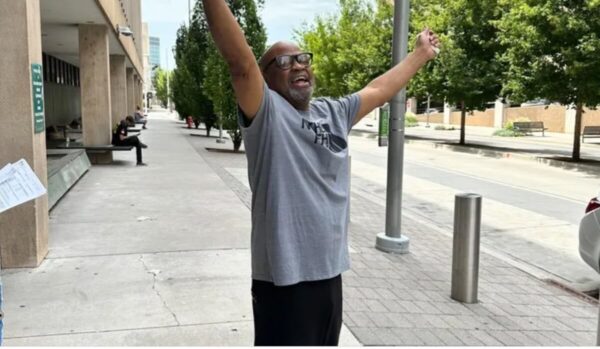An Oklahoma man has been exonerated of a murder he did not commit after serving almost 50 years in prison.
He made history, according to the National Registry of Exonerations, by having the longest-served wrongful sentence in the United States.
On Tuesday, Dec. 19, Judge Amy Palumbo of Oklahoma County District Court declared Glynn Simmons innocent of the crime.

“This is a day we’ve been waiting on for a long, long time. It finally came,” Simmons said, according to KFOR, adding, “We can say justice was done today, finally, and I’m happy.”
Simmons was initially sentenced to the death penalty and incarcerated in 1975 at the age of 22 after being convicted of first-degree murder in connection with a liquor store robbery in Edmond, Oklahoma, on Dec. 30, 1974. The 22-year-old Black man had been more than 700 miles from Edmond that day.
The now-71-year-old Simmons was convicted of killing white store clerk Carolyn Sue Rogers during the robbery. Another woman was shot in the head during the robbery but survived, and she was their primary witness after the crime.
Three days after the slaying, the eyewitness, then-18-year-old Belinda Brown, told police from her hospital bed that the liquor store holdup was perpetrated by two Black men, and she helped their composite sketch artist with a description of the pair.
But after the leads in the case went cold, Edmond Police returned to Brown in February 1975 with a series of lineups consisting of Black men who had been arrested at a party nearby Oklahoma City.
The white woman participated in eight separate lineups and identified at least five men as potentially being involved in the shooting.
Somehow, Simmons and another man named Don Roberts were named as the suspects.
“I never was picked out of a lineup,” Simmons said in an interview with News 4. “I’m still trying to figure out how did I get identified as the suspect? How did the police make me the suspect when the witness didn’t even identify me?”
Before this trial, neither Simmons nor Robert knew each other. Both of them also had alibis regarding where they were on the day of Rogers’ slaying.
Simmons was in Harvey, Louisiana, at the time the women were shot. None of the detectives working on the case checked Simmons’ alibi or went to Louisiana to verify his story of where he was.
They did check Roberts’ alibi. The Edmond Police detectives traveled to Texas and discovered he had punched a time clock at the time of the murder. However, they did not believe the evidence to be reliable, and in 1975, Roberts, who was 21 at the time, was convicted of the murder. Like Simmons, who was labeled as the shooter, Roberts was given the death penalty, which was later modified in 1977 to life in prison for both. Roberts was paroled in 2008.
Decades later, a fresh look at Simmons’ case led to his exoneration after 48 years and 18 days.
In 1997, it looked like everything began to change for him when he hired a private investigator. Back in the 1990s, the Oklahoma Court of Criminal Appeals admitted that the state had kept important evidence from the Simmons case. This withholding of evidence is known as a Brady violation and is unconstitutional.
Still, Simmons could not obtain a new trial.
In 2019, he hired a new attorney, Joe Norwood, a civil rights lawyer who had worked to get others exonerated after being wrongfully convicted. He worked for three years to shape a case to present to the courts to support Simmons’ wrongful conviction.
In 2022, Norwood presented a new motion and obtained a hearing before Judge Palumbo in April 2023. Palumbo issued her ruling on the appeal in July when she vacated Simmons’ conviction and ordered him released on bond immediately. He had served 48 years, five months, and 18 days for a crime he did not commit.
Last week, in a courtroom session delivering her ruling on Simmons’ application for exoneration, Pulumbo ruled that “by clear and convincing evidence” which had never been shared with his defense lawyers in the 1970s, Rogers’ murder “was not committed by Mr. Simmons.”
After he was released in July, Simmons, who recently has been diagnosed with stage 4 cancer, spoke to the press about never giving up.
“It’s a lesson in resilience and tenacity. Don’t let nobody tell you that it can’t happen, because it really can,” he said, The New York Times reported.
Simmons’ lawyer, Norwood, said that the exoneration provides grounds for a federal civil rights lawsuit, and there’s a potential state lawsuit where he may receive up to $175,000 in compensation. In Oklahoma, wrongful conviction settlements are restricted by statute to a maximum amount of six figures.
“He was deprived of work experience and being able to have a career where you could financially secure yourself and your family. All of that was taken from him,” the attorney said after last week’s ruling, noting that Simmons can’t provide for himself and has been living off of donations made through a GoFundMe.
Over the past three months, the crowdfunding campaign has received 3,200 donations and raised $314,000 of the $500,000.


